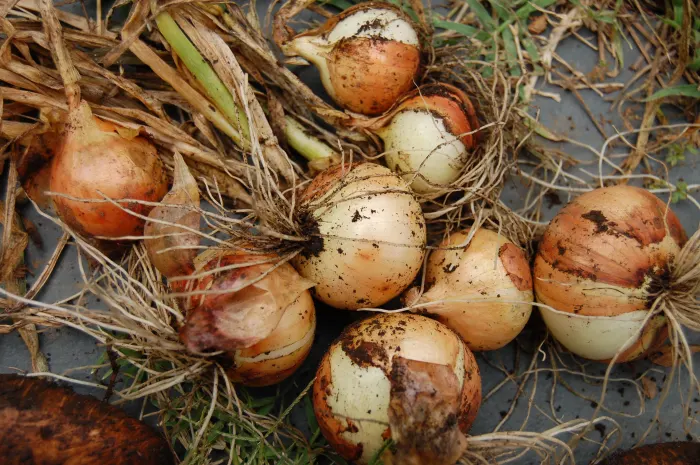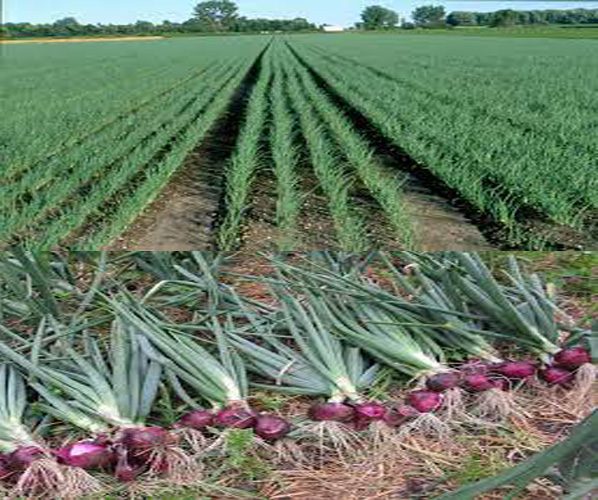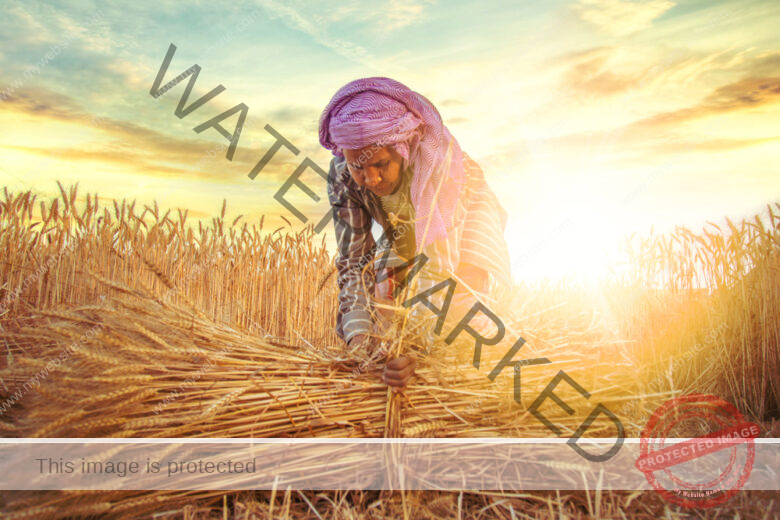How to grow onions in south Africa- Onions farming is important Farming that needs more hands in South Africa. Onions are widely consumed in different forms, it is used as spicy, used to cook stew, eaten raw, and many other forms.
The demand for onions is always high all around the year in South Africa and many parts of the world, hence, it is imperative to learn how to start planting onions in your backyard or venture into it in a large scale format.
To start growing onions in South Africa, you need fertile land with low water retention, a good cultivar or sett of onions, a practicable knowledge of onion planting, funds for starting the business, and more we will be showing you in this content.
How To Start Planting Onions In South Africa Step By Step Guide
Here are the quick guidelines on how you can start growing Onions in SA;
Step 1: Get the soil ready to plant.
First of all, there are different ways to plant onions in South Africa. You can use sacks or plant them right in the beds you made on the farm.
In this guide, we will use the farm bed instead of the sacks.
Clean up the fields.
First, you’ll need to clean up your farm area. Clear the farm of weeds, shrubs, roots, and other plants that don’t belong there.
Put the grass in one place and got them together to set it on fire.
Read Also: How To Start Farming With No Money In South Africa (Zero Capital)
Using Herbicides To Spray The Farm
After clearing your farmland and burning the bushes, you should spray it with fungicides and herbicides. You can also use systemic selective herbicides, which can keep weeds under control for at least three months in your farm area.
Making Bed/low-ridges
The next step is to make a bed for your onions. To make a bed for your onions, you make ridges that aren’t too high, especially during the dry season.
Make sure the beds are short and close to the ground so the seeds can get the small amount of water they need to grow.
Read Also: How To Start Farming Business In South Africa {Beginners Guide}
Putting in manure or chicken dung
If you want your onions to grow well and quickly, the next step in preparing the soil is to add manure to your beds.
You can use the right amount of fertilizer, and if you don’t have money for fertilizer, you can use organic fertilizer instead.
Find a chicken in your area, collect its droppings, and add them to your farm beds at least two weeks before you plant.
Step 2: Buy Good Onions Seed To Nurse
After you’re done preparing the soil and farm, it’s time to look out for your onions’ seeds. To do this, do the following:
Find a farm store near you and buy hybrid onion seeds.
Then, go to a nearby furniture shop or Sawmail and collect the wood shavings, which people in your area call “sawdust.”
You also need to get some dried bird droppings.
You mixed the wood shavings you got with the dry bird droppings you got and added a little water to make it moist.
Read Also: How To Start Pig Farming In South Africa [Step By Step Guide]
Then, put this mixture on the nursery path or the trough you have to care for the seed.
Make ridges with this mixture by putting it in horizontal lines about 2 cm apart on the nursing tray.
Then, put the hybrid seeds you just bought from the agro store in a random pattern on this tray and cover them with a little sand.
Start watering the tray in the morning and at night, but don’t water the lines where the onions are spread.
This is because onions don’t like a lot of water; you only need to wet the bottom of your line.
This should be done for 10 days. Most onion seedlings are alive and ready to be planted after no more than 10–15 days.
Step 3: Begin to plant.
The next step is to start moving your onions to the bed you made in the farm.
Note that if you want to grab your onions when they are still green, you should plant the seedlings 1 cm deep and make sure they don’t touch each other on the bed.
But if you want to pick it when it’s dry, you should plant it 1 cm deep and leave at least 2 to 3 inches between each plant and 10 to 12 inches between rows.
Observe temperature during nursing and after transplantation.
The month of Onion Planting in South Africa
Usually, you can grow onions all around the year in South Africa but onions are usually planted around February and April in the northern part of the country, in the central part of the country onions is usually grown between April and July and July to October in the southern area of the country.
Essentials Care For Onions In South Africa
Ensure that the temperature in the nursery ranges between 20 and 25 degrees Celsius for best productivity. And a temperature of 15 to 30 degrees Celsius after transplanting.
This is due to the fact that greater temperatures promote curing and bulbing.
Onions grow well in the sand that does not retain water for an extended period.
Ensure that the farm receives sufficient water during the bulbing phase of onion growth.
Avoid flooding and excessive water on your onion farm.
Do not put fresh poultry droppings on the farm bed to prevent the onion bulb from developing a thick neck and excessive leaf.
Ensure that you weed the bed frequently or use pesticides to eliminate weeds.
To avoid weeds, mulching can be used to improve soil fertility while preventing underground weeds from receiving sunlight.
Ensure you apply fungicides to your farm to prevent common onion diseases such as Fusarium and Sclerotium.
Milthane, Oshothane, and Dithane have often utilized fungicides.
Spray Insecticides to combat onions pests such as aphids, thrips, and whiteflies.
How Long Do Onions Take To Grow In South Africa?
Onions maturity is usually within 3-4months in South Africa. This usually varies owing to the degree of temperature, the higher the temperature, the faster it becomes for the onion to attain maturity
How Do I Know Onions Are Mature For Harvesting?
When you observed the top left has started falling off and is becoming dry.
How Do You Grow Onions In The South?
To start growing onions in South Africa, you need fertile land with low water retention, a good cultivar or sett of onions, a practicable knowledge of onion planting, funds for starting the business, and more we will be showing you in this content.
Is Onion Farming Profitable In South Africa?
Onions farming is one of the most lucrative farming businesses in South Africa. Onion farming is stress-free, quick to mature for Harvesting, and requires low capital to start up with greater ROI.
Best Time To Plant Onions In South Africa
The best planting season for onions in South Africa is between April and March or July to October.
But usually, you can grow onions round the year if you can manage your farm moisture and temperature.
Types Of Onions To Grow In South Africa
Usually, it is advisable to plant a short day variety of Onions in South Africa and they include Hanna, Texas Grano, Red Creole, San, and Shahar.
Conclusion
South African farmers are engaging in onion farming in recent years in a large-scale format, we have given you a step-by-step guide on how you can start onion farming in South Africa, and all you need to know.





I want to start planting, growing and harvesting onions. Can you please assist me with what kind of onion is best to sell on the market?
Thanks for your message Scott.
When considering which type of onion to grow for the market in South Africa, it’s important to take into account factors such as market demand, local climate conditions, and the specific requirements of different onion varieties.
While I can provide some general guidance, it’s always recommended to consult with local agricultural experts or farmers in your region for more precise recommendations.
In South Africa, some popular onion varieties that are well-suited for commercial cultivation include:
Granex or Sweet Onion: This variety is known for its mild and sweet flavor. Granex onions have a higher moisture content, making them suitable for fresh consumption, including salads and sandwiches. They are often in high demand among consumers.
Texas Grano or Bermuda Onion: These are large-sized onions with a mild flavor.
They are known for their excellent storage qualities and can be sold throughout the year. Texas Grano onions are popular for their versatility in cooking, both as a raw ingredient and when used in various dishes.
Red Creole Onion: This variety has a reddish-purple skin and a slightly milder flavor compared to yellow onions.
Red Creole onions are often sought after for their attractive appearance and are commonly used in salads, salsas, and other dishes where their color can enhance the visual appeal.
Hybrid Varieties: Several hybrid onion varieties are available in the market, offering improved disease resistance, higher yields, and uniform bulb sizes.
These varieties may vary in characteristics, so it’s essential to select a hybrid that suits your specific requirements and growing conditions.
When selecting an onion variety, consider factors such as the climate in your region, disease resistance, market demand, storage capabilities, and the intended use of the onions.
Also, it’s crucial to ensure proper soil preparation, irrigation, and pest management practices to optimize your onion crop’s success.
Remember to reach out to local agricultural organizations, seed suppliers, or experienced farmers in your area to gain more insights into the best onion varieties for your specific location in South Africa.